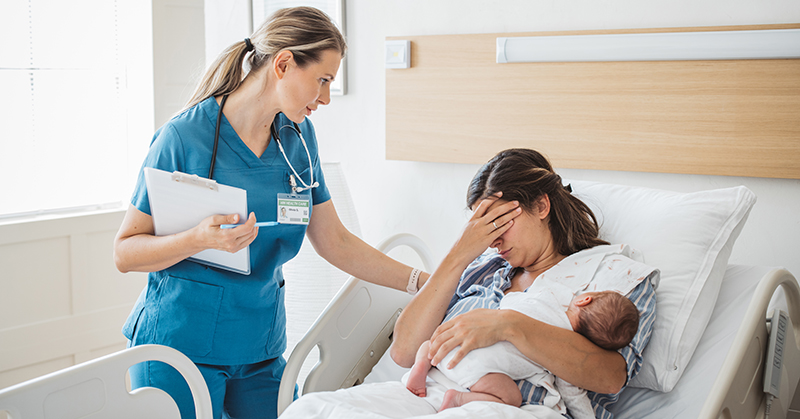NIH-funded study suggests model could identify large percentage of those at risk

WHAT:
Researchers have adapted an artificial intelligence (AI) program to identify signs of childbirth-related post-traumatic stress disorder (CB-PTSD) by evaluating short narrative statements of patients who have given birth. The program successfully identified a large proportion of participants likely to have the disorder, and with further refinements—such as details from medical records and birth experience data from diverse populations—the model could potentially identify a large percentage of those at risk. The study, which was funded by the National Institutes of Health, appears in Scientific Reports.
Worldwide, CB-PTSD affects about 8 million people who give birth each year, and current practice for diagnosing CB-PTSD requires a physician evaluation, which is time-consuming and costly. An effective screening method has the potential to rapidly and inexpensively identify large numbers of postpartum patients who could benefit from diagnosis and treatment. Untreated CB-PTSD may interfere with breastfeeding, bonding with the infant and the desire for a future pregnancy. It also may worsen maternal depression, which can lead to suicidal thoughts and behaviors.
Investigators administered the CB-PTSD Checklist, which is a questionnaire designed to screen for the disorder, to 1,295 postpartum people. Participants also provided short narratives of approximately 30 words about their childbirth experience. Researchers then trained an AI model to analyze a subset of narratives from patients who also tested high for CB-PTSD symptoms on the questionnaire. Next, the model was used to analyze a different subset of narratives for evidence of CB-PTSD. Overall, the model correctly identified the narratives of participants who were likely to have CB-PTSD because they scored high on the questionnaire.
The authors believe their work could eventually make the diagnosis of childbirth post-traumatic stress disorder more accessible, providing a means to compensate for past socioeconomic, racial, and ethnic disparities.
The study was conducted by Alon Bartal, Ph.D., of Bar Ilan University in Israel, and led by senior author Sharon Dekel, Ph.D., of Massachusetts General Hospital and Harvard Medical School, Boston. Funding was provided by NIH’s Eunice Kennedy Shriver National Institute of Child Health and Human Development (NICHD).
WHO:
Maurice Davis, D.H.A., M.P.A., M.H.S.A., of the NICHD Pregnancy and Perinatology Branch, is available for comment.
ARTICLE:
Bartal A, et al. AI and narrative embeddings detect PTSD following childbirth via birth stories. Scientific Reports (2024).
###
About the Eunice Kennedy Shriver National Institute of Child Health and Human Development (NICHD): NICHD leads research and training to understand human development, improve reproductive health, enhance the lives of children and adolescents, and optimize abilities for all. For more information, visit https://www.nichd.nih.gov.
About the National Institutes of Health (NIH): NIH, the nation's medical research agency, includes 27 Institutes and Centers and is a component of the U.S. Department of Health and Human Services. NIH is the primary federal agency conducting and supporting basic, clinical, and translational medical research, and is investigating the causes, treatments, and cures for both common and rare diseases. For more information about NIH and its programs, visit https://www.nih.gov.
 BACK TO TOP
BACK TO TOP